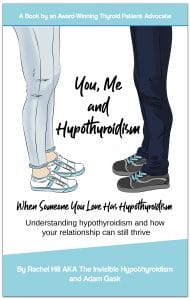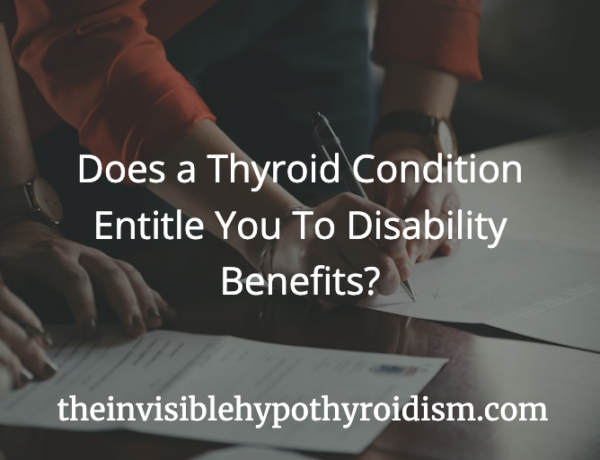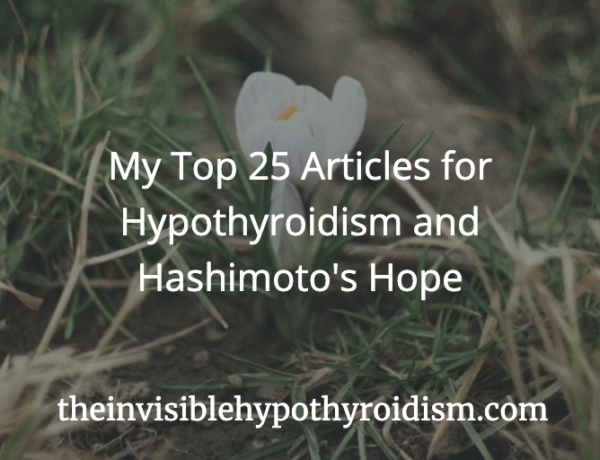Unfortunately, I hear from far too many thyroid patients who experience unhelpful doctors and hear unhelpful remarks.
I’ve heard most of the below comments from medical professionals myself and know that a lot of my readers have, too.
Of course, there are doctors out there who are respectful, listen to their patients and don’t belittle them, but as always, there are also some doctors (and more than we’d like) that aren’t so helpful. They may think that the below comments are helpful advice, a ‘reality check’ or just plain correct, but as people living with thyroid conditions such as hypothyroidism, we know ourselves what it’s really like.
These comments can ‘harm’ us by preventing us from getting the treatment we actually need and recover our health.
1. “It’s All In Your Head.”
This is probably the most reported harmful comment I hear from readers. “It’s all in your head,” can be delivered before or after a thyroid diagnosis. Before diagnosis, many people with a thyroid condition are told that their symptoms must be a figment of their imagination, only to have this proven wrong once a thyroid condition is picked up and diagnosed. Read my article about medical gaslighting here.
After diagnosis, many of us are told that ‘now you’re on thyroid medication’ and ‘your levels are fine’, that any leftover symptoms aren’t possible. Therefore, they must be in our heads.
A GP said this phrase to me when I visited him repeatedly, complaining of my initial thyroid medication (Levothyroxine) not helping at all with my growing list of symptoms (fatigue, dry skin, acid reflux, muscle aches and pains, restless legs, heart palpitations etc.)
Needless to say, I haven’t seen that doctor since, as I was so frustrated that I ditched him and found one who thankfully does listen and has switched me to the thyroid medication I need to feel well and eliminate these symptoms (NDT). So clearly, they weren’t all in my head and were indeed due to the initial type of thyroid medication not working for me.
For many, being on thyroid medication or having test results ‘within range’ isn’t enough to eliminate all symptoms. Sometimes thyroid patients need a different type of medication or to get their thyroid levels to the optimal place within range. Lingering symptoms are often a hint that someone is not optimally treated for their thyroid condition, and passing it off as being ‘all in their head’ leaves many people needlessly unwell.
2. “Just Exercise More and Eat Less.”
As the metabolism is often slowed down in hypothyroidism, we can have symptoms associated with a slow metabolism, such as cold intolerance, extreme tiredness and weight gain. Those with hypothyroidism can gain weight and seemingly not control it. They can also struggle to then lose it, even when forcing strict dieting and unhealthy exercise regimens.
Only when our thyroid hormone levels are optimised, thus correcting our metabolic function, do we have a chance of losing any excess ‘thyroid weight’ and stop gaining it at all. Most of us aren’t just pigging out on unhealthy food all day. And advising us to eat less and restrict calories isn’t helpful. Calorie restriction actually made my thyroid health worse.
A lot of us also do not have the energy to exercise any more than we already do, due to the slowed metabolism of hypothyroidism, and forcing exercise can make you more hypothyroid anyway.
To simply tell us to exercise more and eat less can make our thyroid health worse. It’s so harmful. And it’s dismissive of correcting the actual underlying problem – getting our thyroid condition properly addressed.
3. “Thyroid Conditions Are Easily Managed.”
Some people start thyroid medication and feel well again quite soon after, and these are very lucky people. For others, it can take months or even years to get their thyroid medication right. Thyroid conditions are not always easily managed, but most doctors are taught that they are.
Even if we do eventually get our thyroid medication type and dosage right to optimise thyroid levels, we can still have other conditions which need addressing and keeping in balance too, which can include nutrient deficiencies, adrenal problems, mental health conditions and acid reflux to name just a few. Often, thyroid medication is just one part of the big thyroid jigsaw puzzle and other areas also need to be looked at.
We can also go through flare ups, where symptoms increase and worsen for a period of time. Having hypothyroidism can be very up and down and not always a straight path back to great health. We have to work to keep on top of our health.
Feeding this notion that thyroid conditions are easily treated encourages the stigma that so much of the general population has towards hypothyroidism. Hypothyroidism is a chronic health condition. Unfortunately, this means it tends to come with periods of better and worse health.
4. “You Just Need to Take One Pill a Day and You’ll Be Fine.”
When we take that one thyroid pill a day and don’t magically get better, we worry.
As touched on above, not all of us are as lucky as just taking a Levothyroxine pill and bouncing back to perfect health. Doctors who insist that this is the case make those who don’t have this experience feel alone and confused about what to do next.
5. “Thyroid Flare Ups Aren’t Real.”
Only those that live with a certain health condition can comment on an aspect like this.
Thyroid flare ups are defined as an increase in symptoms of the thyroid condition for a short period of time, usually from a day to a week or so (in my case, usually one or two days).
Symptoms can differ from person to person, although the most commonly reported in a flare up are:
- Increased fatigue
- Heaviness (as if your body is being weighed down)
- Worsened mental health
- Brain fog
- Migraines
- Flu-like symptoms (aches and pains)
- Switching between feeling really cold and really hot
Thyroid flare ups aren’t a medical condition, but a flare up of the thyroid condition, often brought on by doing too much physically, too much stress, viruses, pregnancy, poor sleep and more.
Most health conditions can experience times of worsened health, as well as times of being better managed. This isn’t any different for thyroid conditions.
6. “You Only Need TSH Testing.”
Too many thyroid patients are left undiagnosed, misdiagnosed or diagnosed but not properly treated for their thyroid condition, due to the ‘gold standard‘ of TSH being the only thing tested.
Testing TSH alone is never an accurate way to measure thyroid function (it’s not even a thyroid hormone – it’s a pituitary hormone) which is why we’re advised to have a full thyroid panel tested wherever possible.
This includes:
- TSH
- Free T3
- Free T4
- Thyroid Peroxidase Antibodies
- Thyroglobulin Antibodies
7. “You’re Too Young to Have a Thyroid Condition, so There’s No Need to Test You,” or “You’re Unlikely to Have a Thyroid Condition as a Man.”
Another one that leaves people undiagnosed.
I was told that I was too young to have a thyroid condition as a teenager, yet when finally tested in my twenties, was hypothyroid with Hashimoto’s out of control.
Yes, thyroid conditions are more common in older women, especially middle aged and menopausal, but young people and males of all ages aren’t immune to it. If someone has symptoms, surely they should be tested?
8. “We Don’t Need to Confirm If You Have Hashimoto’s.”
A lot of doctors don’t see the benefit of confirming whether a patient’s hypothyroidism is caused by Hashimoto’s, which is the leading cause of hypothyroidism (at 90%). [1]
However, knowing if your hypothyroidism is autoimmune can affect what treatment and lifestyle changes or other interventions help you to live well with thyroid disease.
When we have Hashimoto’s, there is often a lot of other work to be done, in terms of calming down the autoimmune response and addressing other parts of the body that often go awry. Getting my Hashimoto’s in to remission formed a big part of recovering my health.
9. “You’re Just Depressed.”
Another one I’ve heard and I know many others have too. Pinning my physical symptoms on a mental health condition is far from helpful.
Yes, some people do have depression alongside their hypothyroidism, but it is not the cause for all lingering symptoms, and hypothyroidism is well-recognised to cause and contribute to depression itself.
Not investigating whether the thyroid condition is behind the low mood, and instead plastering another medication over the top just creates a growing list of prescriptions and doesn’t address the root cause, leaving many people needlessly depressed and hopeless.
10. “You’re a Parent, of Course You’re Tired!”
Parents are tired. Especially those with young children. That’s hardly news.
But assuming someone’s fatigue is down to that and not actually checking them, again, means that a lot of people go undiagnosed and untreated for longer than they should have to.
11. “Everyone is Tired!” or ‘”We’re all Tired!”
Thyroid fatigue is different to ‘normal tired’. Please believe that when I tell you I feel fatigued – true thyroid fatigue – it’s not the same as how ‘everyone else feels tired’. I am exhausted and barely able to function.
Dismissing someone’s thyroid symptoms and downplaying them isn’t going to encourage them to come to you in future. They’re not going to feel understood or respected, but instead belittled and lost.
Read “Part 2: More ‘Harmless’ Things Said by Doctors To Thyroid Patients” here.
Would you add anything to this list? Let me know in the comments below.
See also:
The Book You, Me and Hypothyroidism: When Someone You Love Has Hypothyroidism. A book for those who know someone with hypothyroidism. Learn more about how it affects the person you know.
You can click on the hyperlinks in the above post to learn more and see references to information given.
References:
[1] https://www.ncbi.nlm.nih.gov/pubmed/3066320







